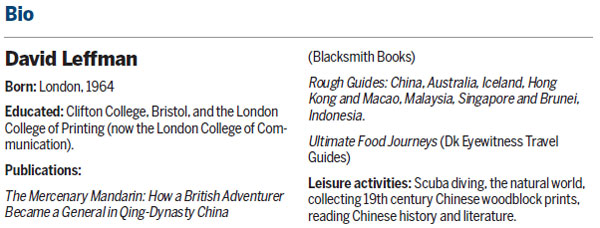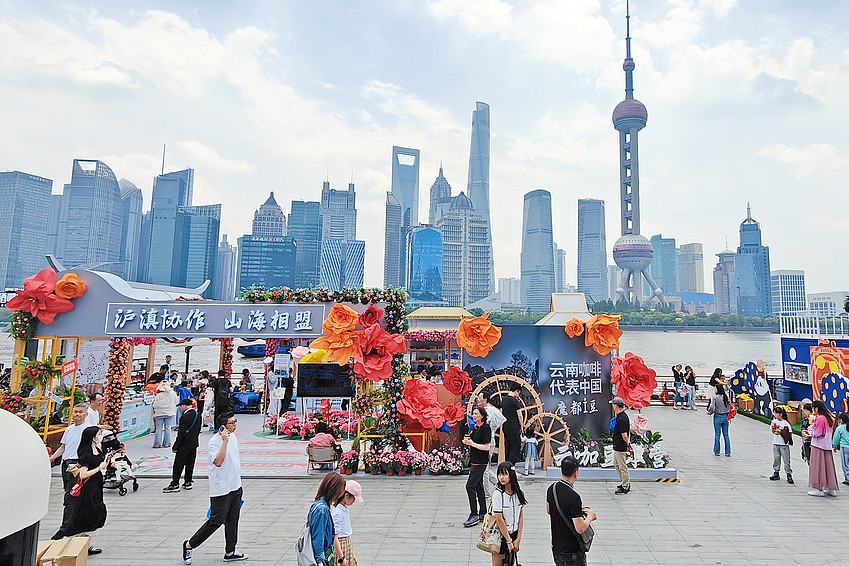A journey from deckhand to emperor's hand

New biography of adventurer William Mesny provides valuable insight into the last decades of the Qing Dynasty
One morning in 1998, David Leffman awoke with a desert-dry throat, a thumping hangover and a notebook littered with jottings about an uprising in the 1860s that resulted in the deaths of 3 million people.
The hangover, courtesy of a three-day "sisters meal" with the Miao people in the southwestern province of Guizhou, eventually subsided, but he couldn't get the scribbled notes out of his mind. Despite being well-grounded in Chinese history, the British author was astonished he'd never heard of the uprising and decided to learn more.


That weekend marked the start of a 15-year obsession with William Mesny, a British adventurer who arrived in China as a penniless sailor in 1860 and rose to the rank of general in the Imperial Army of the Qing Dynasty (1644-1911), before dying as he had arrived almost broke in Shanghai in 1919.
The upshot of that decade and a half of research is Leffman's recently published book, The Mercenary Mandarin: How a British Adventurer Became a General in Qing-Dynasty China. Although a biography, the book also acts as a guide to the history of the period and the conditions under which people lived.
Mesny, a native of Jersey in the Channel Islands, led a dangerous life in China, plying many trades gunrunner, jailer, newspaper columnist, government official, soldier, bridge designer, author and historian, to name just a few before donning his general's uniform.
He spoke fluent Chinese, advocated the modernization of all areas of society, and (unusually for a Westerner at the time) had several close Chinese friends and seemed untainted by notions of superiority. Mesny also married two Chinese women at different times, of course.
His travels were so remarkable, and well-publicized at the time, that it's surprising that The Mercenary Mandarin is the first full biography of Mesny, although Leffman expresses admiration for Keith Stevens' A Jersey Adventurer in China, published in 1992.
In Leffman's hands, Mesny emerges as someone who was always at least in his own accounts in the thick of the action. On the positive side, he was ingenious, industrious, generous, resourceful, courageous and honest. Sadly for Mesny, those attributes were overshadowed by less-admirable qualities, such as impulsiveness, a desire to stand on his dignity and an almost childlike naivety.

He also had a tendency to take credit for other people's ideas, despite his quietly deep Methodist faith, while his refusal to give "gifts" to local officials often hindered his progress in terms of geography and his career.
The first official reference to Mesny comes in 1860 in an Australian newspaper report about the 18-year-old sailor being fined for an unprovoked attack on his ship's bosun. Deciding that seafaring was not for him, Mesny headed to Shanghai. It was a brave move, given that China was in turmoil the Taiping Rebellion (1850-64) was in full swing and with the Second Opium War (1856-60) about to reach its bloody conclusion, British adventurers were far from welcome.
Leffman's introduction to China was less dramatic. In 1985, then a 20-year-old photography student, he was left a small inheritance, so he asked his tutors for permission to travel to China during term time to undertake a photojournalism project.
That visit was hard work because he spoke no Chinese and had only a vague plan of action. He remembers the trip as being "alienating, overwhelming, filthy and depressing".
When his brother arrived in Beijing, the two set out to see the sights. One day, at the Great Wall, they spotted a couple of Westerners being guided by a large group of Chinese officials and surrounded by photographers.
Although they didn't speak, the two groups acknowledged each other. Only later did the brothers realize the two men were George Michael and Andrew Ridgley, then better known as Wham, the first Western pop group to perform in China.
Later, they encountered one another with a depressing regularity. "In those days, there weren't that many places to eat or visit in Beijing, so we constantly saw them (Wham) in restaurants and other places," the 52-year-old author recalls, laughing. "Whenever they spotted us, one of them would mutter, 'It's those guys again.'"
The brothers' presence obviously perplexed Michael, who paid Leffman "a huge compliment by complaining loudly to his entourage of photographers that I didn't look like a Wham fan".
Although he didn't know then, Leffman had been bitten by the China bug.
A few years later, as a fledgling author for the Rough Guide travel series, he used his photojournalism experience to successfully lobby the editors to send him to southwestern China. That trip sparked an ongoing love affair with Guizhou, Sichuan and Yunnan provinces.
In addition to China, Leffman has written guidebooks about many countries and regions, including Iceland, Australia and Indonesia, and has even ghost written a Chinese cookbook.
He estimates he has visited China more than 15 times since that 1985 trip, traveling, observing, learning and writing about a country that has fascinated him for the 30 years he and I have known one another.
"The best moment was finally seeing golden monkeys after 14 years spent looking for them (obviously in the wrong places). The worst was being a passenger in a bus that ran somebody over," he says.
Although it took many years to research Mesny's life, including retracing his steps, Leffman rarely considered he might not finish The Mercenary Mandarin.
"It was something that escalated as I gathered information, rather like reading a good mystery or thriller and increasingly wondering how it was all going to turn out," he explains. "And having spent 25 years working to deadlines, it was an indulgence to set my own pace."
Mesny's affection for most things Chinese is highlighted in The Mercenary Mandarin through his own words, culled from thousands of items, including newspaper articles, published collectively as Mesny's Chinese Miscellany.
Running to 2,000 pages across four volumes, the miscellany contains Mesny's thoughts on life in China - politics, food, social mores, ailments and treatments - and his own perilous financial situation. Everything was grist to his mill, and although he rewrote previously published articles to bring his own role to the fore, the collection remains a valuable window into the last decades of the Qing.
Leffman retraced Mesny's seemingly endless treks, visiting the places where he fought or lived, and interviewing direct descendents of many of his friends and colleagues. But he also set great store in the miscellany as a source for his subject's opinions of the people and events he encountered during nearly 60 years in China.
As Leffman points out in his introduction to The Mercenary Mandarin, the miscellany is an extraordinary work, given that Mesny left school at age 8 and his English was initially poor. As the Channel Islands are geographically closer to France than the British mainland, the Mesny family spoke French at home.
Mesny's life has many parallels with modern China, according to his biographer.
"Then, as now, China was opening up to the world after a period of isolation, and everybody - foreign and Chinese - was jockeying for position, trying to stay ahead of the curve and milk political and social changes for what they were worth," he says. "There's an increasing interest in the foreign view of China, especially during the 19th century."
Leffman has decided that it's now time to close the book on Mesny and is juggling ideas for a new project.
paultomic@chinadaily.com.cn
(China Daily Africa Weekly 04/22/2016 page32)
Today's Top News
- Intl community welcomes 'first phase' of Gaza truce amid hopes for lasting peace
- Export controls on rare earths announced
- Latest plan to realize Gaza ceasefire: Step toward peace or temporary truce?
- China leads by example on Global South climate action
- Xi to attend opening ceremony of the Global Leaders' Meeting on Women, deliver keynote speech
- China records surge in holiday travel during the eight-day break






























